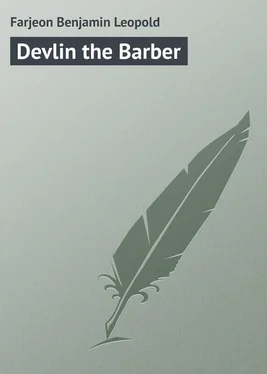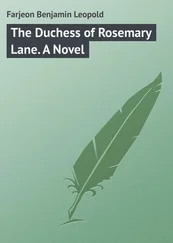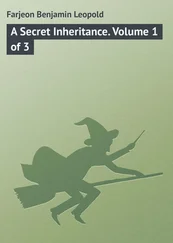Benjamin Farjeon - Devlin the Barber
Здесь есть возможность читать онлайн «Benjamin Farjeon - Devlin the Barber» — ознакомительный отрывок электронной книги совершенно бесплатно, а после прочтения отрывка купить полную версию. В некоторых случаях можно слушать аудио, скачать через торрент в формате fb2 и присутствует краткое содержание. Жанр: foreign_prose, на английском языке. Описание произведения, (предисловие) а так же отзывы посетителей доступны на портале библиотеки ЛибКат.
- Название:Devlin the Barber
- Автор:
- Жанр:
- Год:неизвестен
- ISBN:нет данных
- Рейтинг книги:5 / 5. Голосов: 1
-
Избранное:Добавить в избранное
- Отзывы:
-
Ваша оценка:
- 100
- 1
- 2
- 3
- 4
- 5
Devlin the Barber: краткое содержание, описание и аннотация
Предлагаем к чтению аннотацию, описание, краткое содержание или предисловие (зависит от того, что написал сам автор книги «Devlin the Barber»). Если вы не нашли необходимую информацию о книге — напишите в комментариях, мы постараемся отыскать её.
Devlin the Barber — читать онлайн ознакомительный отрывок
Ниже представлен текст книги, разбитый по страницам. Система сохранения места последней прочитанной страницы, позволяет с удобством читать онлайн бесплатно книгу «Devlin the Barber», без необходимости каждый раз заново искать на чём Вы остановились. Поставьте закладку, и сможете в любой момент перейти на страницу, на которой закончили чтение.
Интервал:
Закладка:
"I suppose, Fanny, you will tell me something more of him."
"That is why I asked you to come, sir. If you're to do any good in this dreadful affair, you must know as much as I do about him."
"Very well, Fanny." I referred again to the first entry in the diary. "After stating that your husband went out with Devlin at nine o'clock in the morning, you say that he returned alone at six o'clock in the evening, and that he did not stir out of the house again on that night."
"Yes, sir."
"I see that you have made a record of the time Lemon went to bed and the time he rose next morning."
"To which, sir, I am ready to take my gospel oath."
"Supposing your gospel oath to be necessary."
"It might be. God only knows!"
I stared at her, beginning to doubt whether she was sane; but there was nothing in her face to justify my suspicion. The expression I saw on it was one of solemn, painful, intense earnestness.
"Go on, sir," she said, "if you please."
I turned again to the concluding words of the first entry, and read them aloud:
"Devlin did not come home all night. I locked the street-door myself, and put up the chain. I went down at seven in the morning, when Lemon was asleep, and the chain was up. I went to Devlin's room, the second floor front, and Devlin was not there!"
"That's true, sir. I can take my gospel oath of that."
"Fanny," I said, with the little book in my hand, closed, but keeping my forefinger between the leaves upon which the first entry was made, "I cannot go any farther until you tell me what all this means."
"After you've finished what I wrote, sir," was her reply, "I'll make a clean breast of it, and tell you everything, or as much of it as I can remember, from the time you saw me last-a good many years ago, wasn't it, sir? – up to this very day."
I thought it best to humour her, and I looked through the remaining entries. They were all of the same kind. Mr. Lemon rose in the morning at such a time; he had breakfast at such a time; he went out at such a time, with or without Devlin; he came home at such a time, with or without Devlin; and so on, and so on. It was a peculiar feature in these entries that Lemon never went out or came home without Devlin's name being mentioned.
I handed the book back to her; she took it irresolutely, and asked,
"Did you read what I last wrote, sir?"
"Yes, Fanny, the usual thing."
"Perhaps, sir, but the time I wrote it; that is what I mean."
"No, Fanny, I don't think I noticed that."
"It was wrote yesterday, sir, and it fixes the time that Lemon came home on Friday, and that he didn't stir out of the house all the night. If I can swear to anything, sir, I can swear to that. Lemon never crossed the street-door from the minute he came in on Friday to the minute he went out agin yesterday. If it was the last word I spoke, I'd swear to it, and it's the truth, and nothing but the truth, so help me God!"
I was about to inquire why she laid such particular stress upon these recent movements of her husband, when there flashed into her eyes an expression of such absolute terror and horror that my first thought was that a spectre had entered the room noiselessly, and was standing at my back. Before I had time to turn and look, Mrs. Lemon clutched my arm, and gasped,
"Do you hear that? Do you hear that?"
CHAPTER VIII
I heard something certainly which by this time, unhappily, was neither new nor strange. It was the voice of a newsboy calling out the last edition of a newspaper which, he asserted with stentorian lungs, contained further particulars of the awful murder in Victoria Park. Amid all the jargon he was bawling out, there were really only three words clearly distinguishable. "Murder! Awful murder! Discoveries! Awful discoveries!"
"Are you alarmed, Fanny," I asked, "by what that boy is calling out?"
"Yes," she replied in a whisper, "it is that, it is that!"
"But you must be familiar with the cry," I observed. "There isn't a street in London that was not ringing with it all yesterday."
"It don't matter, it don't matter!" she gasped, in the most inexplicable state of agitation I had ever beheld. "Lemon never stirred out of the house. I'll take my solemn oath of it-my solemn oath."
I released myself from her grasp, and, running into the square, caught up with the newsvendor and bought a paper. Before I returned to the house I satisfied myself that the paper contained nothing new in the shape of intelligence relating to the murder of my friend Melladew's daughter. What the man had bawled out was merely a trick to dispose of his wares. I had reached the doorstep of Fanny's house when my attention was arrested by the figures of two men on the opposite side of the road. One was a man of middle age, and was a stranger to me. In his companion I immediately recognised George Carton. The elder man appeared to be endeavouring to prevail upon George Carton to leave the square, but his arguments had no effect upon Carton, who, shaking him off, hurried across the road to speak to me. His companion followed him.
"Any news, sir?" cried George Carton. "Have you discovered anything?"
"Nothing," I replied, not pausing to inquire why he should put a question so direct to me.
"Nothing!" he muttered. "Nothing! But it shall be brought to light-it shall, or I will not live!"
"Come, come, my dear boy," said the elder man. "What is the use of going on in this frantic manner? It won't better things."
"How am I to be sure of that?" retorted Carton. "It won't better things to stand idly aside, and think and think about it without ever moving a step."
"My ward knows you, sir," said Carton's friend, "and I confess I was endeavouring to persuade him to come home with me when you were running after the newspaper boy. He insisted that your sudden appearance in this square was a strange and eventful coincidence."
"A strange and eventful coincidence!" I exclaimed, and thought, without giving my thought expression, that there was something strange in the circumstance of my being in Fanny Lemon's house, about to listen to a revelation which was not unlikely to have some bearing upon the tragic event, and in being thus unexpectedly confronted by the young man who was to have been married to the murdered girl.
"Yes, that is his idea," said Carton's friend; "but I am really forgetting my manners. Allow me to introduce myself. You are acquainted with my ward, George Carton, the dearest, most generous-hearted, most magnanimous young fellow in the world. I have the happiness to be his guardian. My name is Kenneth Dowsett."
He was a smiling, fair-faced man, with blue, dreamy eyes, and his voice and manners were most agreeable. I murmured that I was very pleased to make his acquaintance.
"My ward," continued Mr. Dowsett, laying his hand affectionately on Carton's shoulder, "has also an odd idea in reference to this dreadful affair, that something significant and pregnant will be discovered in an odd and unaccountable fashion. Heaven knows, I don't want to deprive him of any consolation he can derive from his imaginings. I have too sincere a love for him; but I am a man of the world, and it grieves me to see him indulge in fancies which can lead to no good result. To tell you the honest truth," Mr. Dowsett whispered to me, "I am afraid to let him out of my sight for fear he should do violence to himself."
"My dear guardian," said Carton, "who should know better than I how kind and good you are to me? Who should be better able to appreciate the tenderness and consideration I have always received at your hands? I may be wilful, headstrong, but I am not ungrateful. Indeed, sir" – turning to me-"I am wild with grief and despair, and my guardian has the best of reasons for chiding me. He has only my good at heart, and I am truly sorry to distress him; but I have my ideas-call them fancies if you like-and I must have something to cling to. I will not abandon my pursuit till the murderer is brought to justice, or till I kill him with my own hands!"
Читать дальшеИнтервал:
Закладка:
Похожие книги на «Devlin the Barber»
Представляем Вашему вниманию похожие книги на «Devlin the Barber» списком для выбора. Мы отобрали схожую по названию и смыслу литературу в надежде предоставить читателям больше вариантов отыскать новые, интересные, ещё непрочитанные произведения.
Обсуждение, отзывы о книге «Devlin the Barber» и просто собственные мнения читателей. Оставьте ваши комментарии, напишите, что Вы думаете о произведении, его смысле или главных героях. Укажите что конкретно понравилось, а что нет, и почему Вы так считаете.












